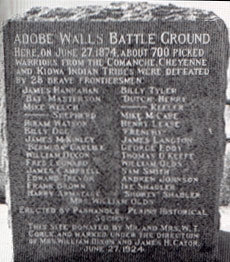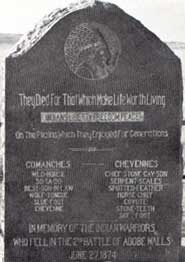Second Battle of Adobe Walls |
|
In early June of 1874, Plains tribes, including Quahida Comanche, usually
reluctant to come near the reservation, took that risk and conferred
with the leaders of the reservation's tribes. Knowledge of increased
buffalo hunting caused great concern among the Indians. A charismatic
medicine man, named Ish-Ta-Ma, claimed he could make the warriors bullet
proof and that his bowel movements would provide rifle cartridges. These
ridiculous claims were taken to heart by the desperate Plains Tribes
who were outraged by the new tactic of the United States encouraging
the decimation of the buffalo herds.
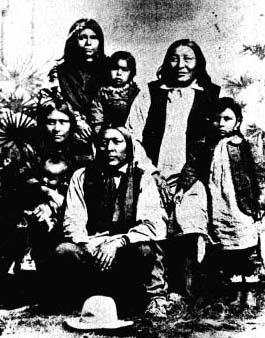
Ish-Ta-Ma and family
Emboldened by Ish-Ta-Ma's prophesies, the combined tribes
of Southern Cheyenne, Comanche and Kiowa, near one thousand strong,
advanced towards Adobe Walls before daylight in what should have been
an easy route. Fate was not in their favor. A beam inside of the camp
cracked at approximately 4:00 a.m. awakening several of the inhabitants,
most of whom had passed out after an extensive drinking session. Nature's
beckoning drew two men outside. As they relieved themselves, they
became aware of the presence of the Indians. Armed with Sharp 50's
the awakened camp successfully held off five to eight raids of the
combined Indian attack force.
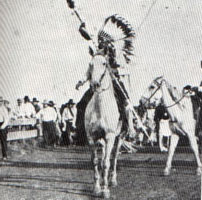
Quanah Parker
Present and assuming leadership for the first time was
Quanah Parker. Quanah's mother was Cynthia Ann Parker, a white captive,
his father Nocona, a Comanche chief. Because of his mixed-blood, and
despite the rank of his father, he had been slow to gain the recognition
he desired. That day he made his reputation through multiple valiant
charges at the door of the fort. Several times he was injured and
several of his mounts were shot from under him.
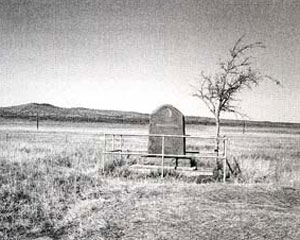
Picture of Adobe Walls Monument from the book,
Encyclopedia of Indian Wars, by Gregory F. Michno.
The effective range of the Sharp 50 was well beyond
a mile. This fact was unknown to the Comanche. A chief said, "white
man shoots today, red man dies tomorrow" after a warrior had
been knocked off his horse by a round fired from the distance walls.
The combined tribes considered further assault of the walls too costly
and voted a retreat.
|
